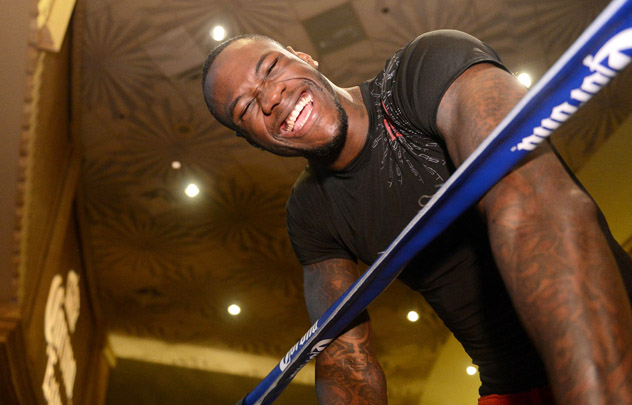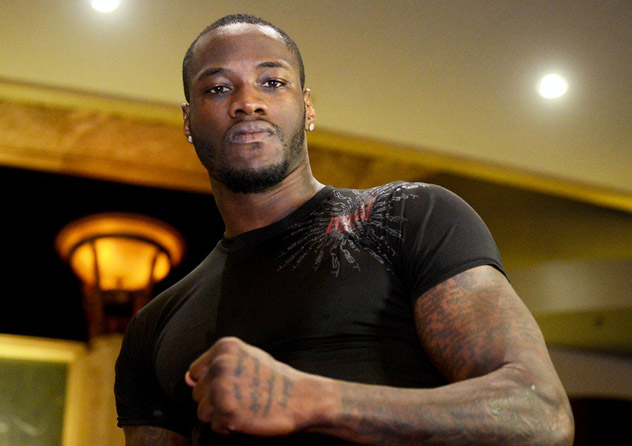We’ll learn a lot about Deontay Wilder on Saturday night


Photo by Naoki Fukuda
LAS VEGAS – Deontay Wilder had just completed another virtuoso performance in the final press conference before he faces Bermane Stiverne on Saturday in an MGM Grand showroom, demonstrating again his ability to sell himself and a fight. After a prolonged staredown, he sat down at the dais and was more circumspect as he spoke to only two reporters.
One mentioned the conventional wisdom, that Wilder obviously has tremendous punching power – 32 fights, 32 knockouts, 18 in the first round – but has yet to face a serious test as a professional boxer, which makes him perhaps the biggest question mark in boxing.
He could become a driving force and multi-millionaire; he could become a bust who will be looking for a second career in short order. We’ll know a lot more on Saturday night.
“Are there questions about me?” he said quietly. “Of course. There are many question marks. I just do what I do; I do my job. The questions will be answered.”
Stiverne, the WBC titleholder, clearly is the toughest challenge of Wilder’s career. The Haitian-Canadian, who lives in Las Vegas, has a better track record by most estimations. That includes back-to-back victories over longtime contender Chris Arreola, the second of which earned him the title.
Wilder’s most accomplished opponent probably was the slick Malik Scott, who lasted only 1 minute, 36 seconds last March.
And while Stiverne is much shorter than Wilder – 6 feet 2 inches vs. 6-7 – he is the much thicker of two. Stiverne weighed in at 239 pounds on Friday, 20 more than Wilder. And Stiverne is known to have a good chin, which could come in handy on Saturday night.
Stiverne’s manager, calm but obviously irked by Wilder’s needling at the press conference, declared then: “I truly believe this is a mismatch.”
“They have to put that kind of thing in their boy’s head,” said Wilder, who didn’t seem to care much about the slight. “I think he’s the one who is nervous, scared. I know when I see fear. They can do all the talking they want. Come Saturday, we’ll find out.”
Wilder and his handlers also don’t buy into the prevailing perception of the 29-year-old from Tuscaloosa, Alabama, and the fight on Saturday.
“I don’t feel this is my biggest test,” Wilder said. “I don’t feel it’s a test at all. People keep talking about the (second) fight with Arreola. They say styles make fights. Arreola’s style fits Bermane’s style. He leans in, which made him vulnerable to big shots. Bermane is a counterpuncher. He saw those mistakes and punched him. It was easy.
“My athleticism alone will win this fight. Shots he usually pops people with won’t hit me. I’m too fast on my feet, too tall, stronger, everything. People will figure it out soon.”
Jay Deas, Wilder’s career-long trainer, was asked whether it was fair to call his fighter a question mark.
“Not to me, he’s not,” said Deas, who works in conjunction with former Olympic and professional champion Mark Breland. “I understand a lot of people may see him that way. I think most them have 20-20 hindsight. They think that because he has knocked out someone that that person must be no good.
“I would counter by saying that Malik Scott is a Top 10 heavyweight who had handled (Vyacheslav) Glazkov, who handled (Alex) Leapai. In my opinion Scott was our best opponent. And I think he’s better than their best opponent. I think Scott beats Arreola nine out of 10 times.
“I don’t think it’s fair,” he went on. “If I go down a notch, the next best guy Stiverne fought is (Ray) Austin. I think Deontay’s next best opponent was either (Sergey) Liakhovich and (Audley) Harrison. I think they’ve fought comparable opposition all the way through.”
At the same time, Deas understands the skepticism.
“I can see that,” said Deas, referring to the boom-or-bust perception of Wilder at the moment. “I think we answered some questions against Scott but there are always more questions to answer. ÔǪ And that’s OK. That’s why we’re here and why we’re excited to be here.
“And I think it’s fair to say Deontay is still developing. The heavier a fighter is, the later he has his prime. A 29-year-old bantamweight is an old man. A 29-year-old middleweight is in his prime. A 29-year-old heavyweight is a young guy.
“Deontay is probably three years away from entering his prime. Look at guys like Lennox Lewis and (Wladimir) Klitschko. They were in their 30s when they were in their primes.”
The one weapon Wilder delivers with mastery is his lethal right hand, the punch for which he is feared.
But while Wilder also acknowledges that he is still learning his craft, he said Stiverne is making a mistake if he thinks Wilder is limited to the right. He believes that type of thinking would backfire on Stiverne.
“It’s a good thing that people think that,” he said. “I hope my opponent is hearing that. That will work in my favor. So keep thinking about my right hand. ÔǪ Then you’ll get caught with something else. Either way, you’ll get hurt.”
Finally, some wonder how Wilder will perform on a stage of this magnitude. He has had some significant fights but nothing approaching this.
He said his experience in the 2008 Olympics in China has helped him meet the demands of a high-profile fight. Wilder won a bronze medal, making him the last American man to win an Olympic medal of any kind.
Now he hopes to become the first American heavyweight to hold a major world title since Shannon Briggs lost the WBO belt in 2007.
“The Olympics prepared me for all this,” he said. “What bigger stage is there than the Olympics? Thousands of people were there and millions watched on TV. We took classes at that time to prepare us (to handle the media). I’m used to this.
“I might be from a small town but I love this.”
We’ll see if he feels the same way after the fight.














